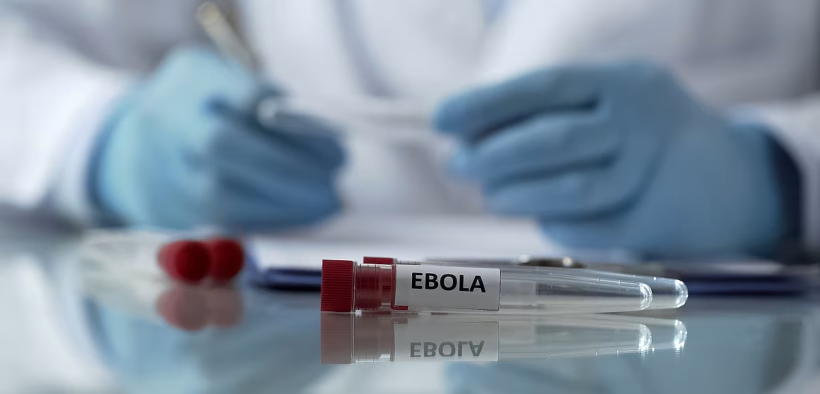Uganda Launches Historic Ebola Vaccine Trial for Sudan Strain
TSP News Network
February 7, 2025

In a landmark development, Uganda, in collaboration with the World Health Organization (WHO) and global health partners, has initiated the first-ever clinical trial for a vaccine designed to combat the Sudan strain of the Ebola virus. Remarkably, the trial commenced just four days after the outbreak was confirmed on January 30, setting a new precedent for rapid emergency response in vaccine development. If successful, this groundbreaking initiative could revolutionize outbreak control strategies and pave the way for regulatory approval of a much-needed vaccine.
Advertisements

Historic Trial
- First-ever clinical trial targeting the Sudan strain of the Ebola virus.
- Launched within four days of outbreak confirmation, demonstrating unprecedented speed in emergency response.
- Currently, no licensed vaccine exists for the Sudan strain, unlike the Zaire ebolavirus.
Leading Institutions & Global Support
- Led by: Makerere University and the Uganda Virus Research Institute (UVRI).
- Supported by: WHO, Coalition for Epidemic Preparedness Innovations (CEPI), Canada’s International Development Research Centre (IDRC), EU HERA, and Africa CDC.
- Vaccine Donor: The non-profit organization IAVI.
Procedure & Expectations
- Ring vaccination strategy deployed, targeting contacts of confirmed cases.
- Strict adherence to national and international ethical and regulatory standards.
- Results anticipated within months, potentially shaping future global outbreak response protocols.
Ebola Virus Overview
- Discovery: Identified in 1976 in the Democratic Republic of the Congo (DRC).
- Virus Family: Orthoebolaviruses (formerly known as ebolavirus).
- Name Origin: Named after the Ebola River, near the site of the first recorded outbreak.
- Primary Hosts:
- Natural Reservoir: Fruit bats (Pteropodidae family).
- Other Affected Species: Gorillas, chimpanzees, monkeys, forest antelope, and porcupines.
Transmission
- Zoonotic Origin: Ebola enters the human population through direct contact with bodily fluids of infected animals (e.g., bats, primates).
- Human-to-Human Spread: Transmission occurs through direct contact with blood, secretions, or body fluids of an infected person—living or deceased.
Symptoms of Ebola
- Incubation Period: Symptoms develop between 2 to 21 days after exposure.
- Common Symptoms:
- Fever
- Severe fatigue
- Diarrhea & vomiting
- Internal & external bleeding
- Organ failure
- High fatality rate (~50%)
Treatment & Recovery
- No Approved Cure: A definitive cure for Ebola has yet to be developed.
- Experimental Treatments:
- Inmazeb and Ebanga—two FDA-approved monoclonal antibody treatments for the Ebola Zaire strain.
- These treatments have shown promise but remain unverified for the Sudan strain.
- Supportive Care Measures:
- Fluid & electrolyte management
- Blood transfusions & plasma therapy to control bleeding
- Recovery Factors:
- Virus exposure level
- Timely medical intervention
- Individual immune response & age
Summary at a Glance
| Category | Details |
|---|---|
| Why in the news? | Uganda launches a historic Ebola vaccine trial. |
| Targeted Virus Strain | Sudan species of the Ebola virus. |
| Trial Location | Uganda |
| Leading Institutions | Makerere University, Uganda Virus Research Institute (UVRI) |
| Supporting Organizations | WHO, CEPI, IDRC (Canada), EU HERA, Africa CDC |
| Vaccine Type | Recombinant vesicular stomatitis virus (rVSV) vaccine |
| Vaccine Donor | IAVI (non-profit organization) |
| Ethical Compliance | Strict adherence to national & international standards. |
| Expected Timeline | Data collection within months. |
| Global Impact | Potential regulatory approval & improved outbreak response. |
| Ebola Discovery Year | 1976 |
| Virus Family | Orthoebolaviruses (formerly ebolavirus) |
| First Discovery Location | Democratic Republic of the Congo (DRC) |
| Virus Hosts | Fruit bats, gorillas, chimpanzees, monkeys, forest antelope. |
| Transmission | Zoonotic (animal to human) & human-to-human via bodily fluids. |
| Key Symptoms | Fever, diarrhea, vomiting, bleeding, high fatality rate (~50%). |
| Treatment Options | No cure; FDA-approved monoclonal antibodies for Ebola Zaire; supportive care (fluids, plasma). |
| Incubation Period | 2 to 21 days. |
| Fatality Rate | Approximately 50%. |
| Current Therapies | Fluid & electrolyte balance, blood/plasma therapy, experimental treatments. |








